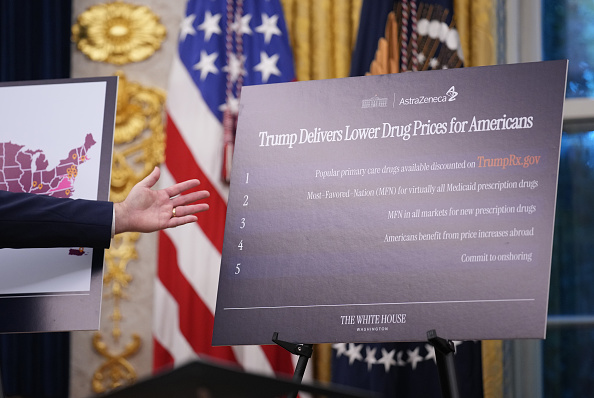Despite dropping out of the race for president in August, Robert F. Kennedy, Jr. is turning up the volume on reforming national health care and drug policy and attracting attention to what role he might play in an administration depending on the outcome of the November election.
Kennedy has endorsed former President Donald Trump, and Trump has hinted that there could be a role for him in his second Trump administration.
Kennedy, who founded the safety advocacy group Children’s Health Defense, recently revealed the scope of his health care recommendations through his “Make America Healthy Again” agenda. Trump named Kennedy to his transition team and pledged to establish a panel of experts to work with Kennedy to investigate the increase of chronic health problems and childhood diseases in the United States (see related articles, pages 8,9).
In a September 5 op-ed in The Wall Street Journal, Kennedy laid out his 12-point Make America Healthy Again plan. Some of the ideas include reducing conflicts of interest at federal health agencies, implementing drug price caps, setting chemical and pesticide standards, requiring nutrition classes in medical school, redirecting money toward preventative care, rereleasing a presidential fitness standard, and expanding health savings accounts.
Boundary Crossing
Over the years, Kennedy has not hesitated to express his opinions, many of which have challenged long-held positions of the public health establishment on issues from vaccines and childhood obesity to the role of big pharmaceutical companies.
Kennedy’s stances cross ideological boundaries. His support of a single-payer national health care system conflicts with free-market opinions on the right, and his criticism of big-government bullying alienates the left. The nation’s painful experience with the measures taken to stem the spread of COVID-19 has attracted attention to Kennedy’s health care opinions in the wake of his forceful criticisms of those policies.
In a wide-ranging interview with Preferred Health magazine in June, Kennedy lambasted the lockdowns and the people he says profited from them.
“The people who came into the pandemic with a billion dollars, the Bill Gates, the Mark Zuckerbergs, the Bloombergs, the Jeffery Bezos, increased their wealth on average by 30 percent,” Kennedy told the publication.
“The lockdowns were a gift to them, the super-rich,” said Kennedy. “Jeffery Bezos, the richest or second-richest man in the world, was able to close down all of his competitors, 3.3 million businesses, and then give us a two-year training course about how to never use a retail outlet again in our lives. Forty-one percent of the black-owned businesses will never reopen. And he was instrumental because he was censoring the books that were critical of the lockdowns, including one that I wrote.”
Insider Advantage
Kennedy’s criticisms appeal to Craig Rucker, president of the Committee for a Constructive Tomorrow (CFACT).
“Kennedy, by virtue of his family name, is an insider, but his unorthodox views make him a provocative outsider,” said Rucker. “The public-health establishment, against which he has railed for years, failed miserably during the coronavirus pandemic. The ties between HHS and Big Pharma are far too cozy, and we have good reason to believe public health suffers as a consequence. A free spirit like his could be just what the doctor ordered.”
NIH Reform Call
Echoing his criticisms of the pandemic response, Kennedy says he wants to overhaul federal health care agencies, beginning with the National Institutes of Health (NIH).
The NIH suppressed the use of ivermectin and hydroxychloroquine during the early stages of the pandemic, in favor of, first, remdesivir and later the COVID vaccines through emergency use authorization, Kennedy argues. Saying the NIH “has been transformed into an incubator for the pharmaceutical industry,” Kennedy recommends removing much of the NIH’s funding for virology.
“It has stepped away from rigorous, evidence-based science, evidence-based medicine, into kind of a magical world,” Kennedy told Preferred Health. “It needs to have scientific discipline reimposed on the entire field of virology. We ought to be funding the study of the etiology of chronic diseases in our universities.”
Focus Shift
Kennedy has also spoken widely on chronic childhood diseases, some of which he has attributed to vaccines. Kennedy has called for public health authorities to shift their focus from infectious diseases such as COVID and influenza to devote more attention to diabetes, obesity, environmental toxins, and other longer-term concerns.
Kennedy has also cited large-scale factory farming and processed food as contributing to the nation’s health problems.
Peter Pitts, president and co-founder of the Center for Medicine in the Public Interest, says Kennedy brings a fresh perspective to public health debates.
“RFK Jr.’s penchant for not taking things at face value could go a long way toward forcing government public-health agencies to argue on behalf of their beliefs rather than simply relying on a ‘because I said so’ defense,” said Pitts.
Surprising Endorsements
Texas Agriculture Commissioner Sid Miller, a Republican, praised Kennedy’s efforts in a September 26 op-ed for Fox News.
“The role of Big Food, much like Big Pharma, is to prioritize their profits over our health,” wrote Miller. “I enthusiastically support RFK Jr.’s campaign to hold these industries accountable by reforming our food and medicine approval and patenting systems. In this he is uniquely qualified: the $1.7 trillion pharmaceutical industry has unfairly maligned him for decades, and he’s still standing strong.”
In a move that raised eyebrows, Robert Redfield, who headed the Centers for Disease Control and Prevention (CDC) under Trump from 2018 to 2021, endorsed Kennedy’s reform efforts in a Newsweek op-ed in September.
“If the next president prioritizes the National Institutes of Health (NIH) to identify which exposures are contributing to the spike in chronic disease in children, we will finally find out and end what is slowly destroying our children,” wrote Redfield.
Bonner Russell Cohen, Ph.D., ([email protected]) is a senior fellow at the National Center for Public Policy Research.
For related articles, click here and here




